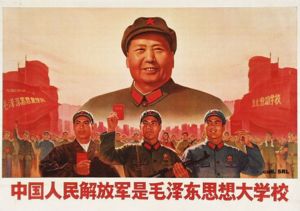Difference between revisions of "Cultural Revolution"
DavidB4-bot (Talk | contribs) (→top: clean up & uniformity) |
|||
| Line 13: | Line 13: | ||
There had been disagreement over the end of the Cultural Revolution. With the death of Mao Zedong in 1977 there was little reason for it to continue. Moreover, with the arrest of the Gang of Four,<ref>http://news.bbc.co.uk/hi/english/static/special_report/1999/09/99/china_50/cult.htm</ref> the elite of the communist party who were overthrown by their own Party. However,1968 has also been given as a date as, with the arrest of Liu Shao-chi, Mao would have no reason to continue the revolution.<ref>http://www.historylearningsite.co.uk/cultural_revolution.htm</ref> | There had been disagreement over the end of the Cultural Revolution. With the death of Mao Zedong in 1977 there was little reason for it to continue. Moreover, with the arrest of the Gang of Four,<ref>http://news.bbc.co.uk/hi/english/static/special_report/1999/09/99/china_50/cult.htm</ref> the elite of the communist party who were overthrown by their own Party. However,1968 has also been given as a date as, with the arrest of Liu Shao-chi, Mao would have no reason to continue the revolution.<ref>http://www.historylearningsite.co.uk/cultural_revolution.htm</ref> | ||
| + | |||
| + | ==See also== | ||
| + | *[[Cultural Marxism]] | ||
| + | *[[Antifa]] | ||
| + | |||
==References== | ==References== | ||
{{reflist}} | {{reflist}} | ||
[[Category:China]] | [[Category:China]] | ||
[[Category:Communism]] | [[Category:Communism]] | ||
Revision as of 03:10, July 8, 2019
The "Cultural Revolution" was a disastrous attempt to reform the economics, education and politics of Communist China, which led to the deaths of tens of millions of people. The upheaval began in August 1966 by Chinese Chairman Mao Zedong. His objective was to replace leaders with people who would think like him and be supportive of him as Chairmen, make the Chinese Communist Party function the way he wanted, give the Chinese youth a revolutionary experience, and make changes so that education, health care, and cultural systems would be for the entirety of China and not just for the elite. In order to do this, he began to establish a cult towards himself. His party would be forced to support him as he had little patience for opponents during what he believe to be the pinnacle point of China's future as a communist state. He quickly began a system of purges to cleanse of any unwanted opposition toward him or to the gang of four, especially after he was embarrassed with the part rejecting his great leap forward policies[1] Mao Zedong wanted the Cultural Revolution to affect everyone in China but it mostly affected those in urban places.
In August 1966 all schools were closed. During this time Mao told the Red Guards to question things that traditionally had great value and importance, and question the activities of government officials by slighting them in a way that was visible to all. This resulted in the harm and even death of many people. In the end, Mao Zedong achieved none of what he wanted.
He began this revolution in his last ten years of power because he feared that China would become like the Soviet Union and that he might have a bad, if any, place in history.
Like Job, he feared that "my life is wind: mine eye shall no more see good."[2]
There had been disagreement over the end of the Cultural Revolution. With the death of Mao Zedong in 1977 there was little reason for it to continue. Moreover, with the arrest of the Gang of Four,[3] the elite of the communist party who were overthrown by their own Party. However,1968 has also been given as a date as, with the arrest of Liu Shao-chi, Mao would have no reason to continue the revolution.[4]
